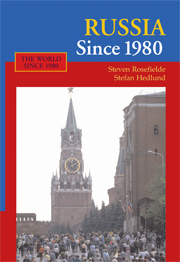Book contents
- Frontmatter
- Contents
- List of Figures, Tables, and Boxes
- Acronyms
- Timeline
- Preface
- Acknowledgments
- Introduction
- PART I RUSSIA BEFORE 1980
- PART II GORBACHEV
- PART III YELTSIN
- PART IV PUTIN
- PART V ADVANCE AND RETREAT
- PART VI PROSPECTS
- 13 Sustainable Growth
- 14 Russia in the Chinese Looking Glass
- Conclusion
- Glossary
- Bibliography
- Index
- References
14 - Russia in the Chinese Looking Glass
Published online by Cambridge University Press: 05 June 2012
- Frontmatter
- Contents
- List of Figures, Tables, and Boxes
- Acronyms
- Timeline
- Preface
- Acknowledgments
- Introduction
- PART I RUSSIA BEFORE 1980
- PART II GORBACHEV
- PART III YELTSIN
- PART IV PUTIN
- PART V ADVANCE AND RETREAT
- PART VI PROSPECTS
- 13 Sustainable Growth
- 14 Russia in the Chinese Looking Glass
- Conclusion
- Glossary
- Bibliography
- Index
- References
Summary
Hope springs eternal for Russophiles, and in today's world hope may seem justified by the recent successes of authoritarian China. Could a “China card” raise Muscovy's growth prospects above its historical norm? Probably not, but the possibility warrants careful consideration.
China shares many of Muscovy's characteristics and propensities, with a few critical differences that may withstand the test of time. First and foremost, both civilizations are imperial, ruled by omnipotent emperors (Communist Party first secretaries, presidents), with the power of unrestricted informal command (but not totalitarian nanomanagement) over their subjects. Both have laws and judiciaries but not the politically tamper-proof rule of contract law required for well-functioning markets in the West. Both, at least since 1992, grant state enterprise managers extensive custodial rights, and in many instances proprietary stakes as well. Most state companies are allowed to engage in for-profit consumer business and act entrepreneurially. Private enterprise is permitted based on leases of varying duration, and in Russia, freehold ownership has become widespread. Russia and China both have formally or informally managed foreign exchange rates and some state price-fixing, but for the most part, prices are partially competitive in varying degrees. Both permit licensed transactors to participate in international trade and publicly welcome foreign direct investment. Both are adept at pirating foreign technologies, illegally copying trademarked designs, and flouting intellectual property rights. Both have powerful regulatory economic bureaucracies, employing conventional monetary, fiscal, and administrative policies to manage aggregate effective demand.
- Type
- Chapter
- Information
- Russia Since 1980 , pp. 261 - 270Publisher: Cambridge University PressPrint publication year: 2008

